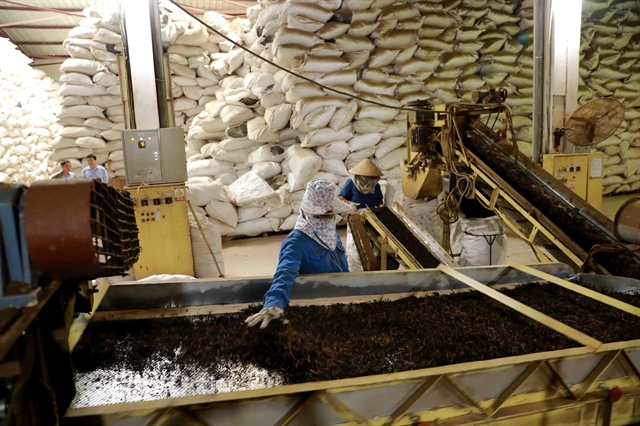.jfif) Opinion
Opinion


|
| Phú Đa Tea Company based in Thanh Sơn District, the northern province of Phú Thọ, exports mainly to the US, Russian, and Middle East markets. VNA/VNS Photo Vũ Sinh |
Associate Professor Doctor Dương Anh Sơn, dean of the Economics Law Department at the HCM City University of Economics and Law talks to Sài Gòn Giải Phóng (Liberated Sài Gòn) newspaper about what the Government should do to help enterprises stand firm during the COVID-19 pandemic
What solutions should the Government adopt to help enterprises through the COVID-19 pandemic?
Given that several free trade agreements Việt Nam has signed with other countries and regions have come into force, leading to the slashing of many trade tariffs, some even dropped to zero, this is the prime time for Việt Nam to increase its exports. This is a great opportunity to build up more foreign currency for the State budget. However, to achieve this target, the Government must support specifically production enterprises, not just enterprises in general.
Of course, with a constrained budget, there is no other choice for the policymakers than to give the higher priority to the field of production, particularly in areas with high export turnover or high added values. For example, between exports of garment products and exports of agricultural products, including rice, we have to calculate carefully which product offers higher benefits to the economy.
What about other sectors, for example, real estate industry is also calling for help?
If the price of real estate increases, people's dream of having a place to call home and settle their lives would get a little more unreachable. So from my point of view, we need to invest into long-term production strategies to ensure sustainable growth rather than invest to make quick bucks.
If we want to invest more in production, where should we focus our investment?
Regarding a long term strategy, the State should offer special support to advanced technology, particularly information technology in production and commerce, to cut costs and increase our competitiveness. Let me give you an example, why is that the price of Việt Nam's sugarcane is always higher than our neighbouring countries? This can be attributed to the reason that we don’t have large-scale fields where automation and mechanical technology can be applied during cultivation and harvesting. That’s why the price of our sugarcane is always higher.
Adding to that, the Government should promote awareness on origin rules and quality requirements. The Government should also help enterprises to look for new markets through investment promotion. Some promotions have been launched, but the results have been very limited.
Last but not least, for most Vietnamese enterprises nowadays, they are in big shortage of cash to invest in production expansion, so stimulus packages are needed, especially for the prioritised sectors and businesses.
How should we address the problem of capital shortages when the State budget is limited?
An important component of the State budget is the money collected from taxes. The Government could also look at potential revenues from other sources such as through the restructuring of State enterprises and equitisation, but this is happening very slowly.
Leasing out land could generate a big sum of money for the State budget, but it needs to be controlled through transparent bidding and price scheme to eliminate any possible illicit activities and corruption.
What will happen to future generations when all the public land has been sold?
Under Vietnamese law, the land always belongs to the people, so whether it is leased out or not is not an important issue. What’s more important is how to use the land efficiently and effectively so that revenue collected from the land is invested properly. When enterprises receive support from the Government and prosper, it's natural they would make a greater contribution to the State budget through the taxes they pay. — VNS




